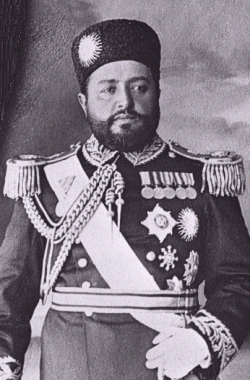Loading AI tools
Emir of Afghanistan from 1901 to 1919 From Wikipedia, the free encyclopedia
Habibullah Khan (Pashto/Dari: حبيب الله خان ; 3 June 1872 – 20 February 1919) was the Emir of Afghanistan from 1901 until his assassination in 1919. He was the eldest son of the Emir Abdur Rahman Khan, whom he succeeded by right of primogeniture in October 1901. His grandfather was Mohammad Afzal Khan.[1][2]
| Habibullah Khan I | |
|---|---|
| Emir of Afghanistan | |
 | |
| Emir of Afghanistan | |
| Reign | 1 October 1901 – 20 February 1919 |
| Predecessor | Abdur Rahman Khan |
| Successor | Nasrullah Khan |
| Born | 3 June 1872 Samarkand, Emirate of Bukhara[1][2] |
| Died | 20 February 1919 (aged 46) Kalagosh, Laghman Province, Afghanistan |
| Dynasty | Barakzai dynasty |
| Father | Abdur Rahman Khan |
| Mother | Asal Begum |
| Religion | Sunni Islam |
Habibullah was the eldest son of Emir Abdur Rahman, and was born in Samarkand, Uzbekistan to a Pashtun family in 1872. He had a younger brother, born on December 7, 1874, Nasrullah Khan.

Habibullah was a relatively reform-minded ruler who attempted to modernize his country. During his reign he worked to bring modern medicine and other technology to Afghanistan. Many people who were forced into exile by his father were returned to Afghanistan by a general amnesty decreed by Habibullah.[3] In 1901, Habibullah passed a law forcing Hindu men to wear yellow turbans and women to wear a yellow veil in public in order to distinguish them from Muslims and to discriminate against.[4] In 1903, Habibullah founded the Habibia school as well as a military academy. He also worked to put in place progressive reforms in his country. He instituted various legal reforms and repealed many of the harshest criminal penalties. One of his chief advisers, Abdul Lateef was sentenced to death in 1903 for apostasy, being stoned to death in Kabul. Other reforms included the dismantling of the internal intelligence organization that had been put in place by his father. Qala-e-Seraj in Mihtarlam was built by the Habibullah c. 1912–13 to spend his winters.[5][6]
In May 1912, Habibullah faced the only crisis in his career when a rebellion, known as the Khost rebellion, erupted in Khost led by Jehandad Khan, a rival claimant to the Afghan throne.[7] This rebellion ended in August that same year, when the rebels were given concessions by the Afghan government.[8]
Habibullah maintained the country's neutrality in World War I, despite strenuous efforts by the Sultan of the Ottoman Empire and a German military mission (Niedermayer–Hentig Expedition) to enlist Afghanistan on its side. He also greatly reduced tensions with British India, signing a treaty of friendship in 1905 and paying an official state visit in 1907. While in India, he was initiated into Freemasonry, at Lodge Concordia, No. 3102.[9][10]
In the summer of 1918, an ultimatum was sent to Habibullah. The ultimatum demanded the formation of a constitutional government and was followed by a threat, which was disregarded. During prepared celebrations for his birthday, Habibullah was shot at while driving through the Shor Bazaar in Kabul. However, the bullet only hit the car he was driving in.[11] Habibullah requested Mustufi Husain Khan to find the assailants, and utilized this attempt to remove political dissenters and reformers against his government. Mustufi Husain identified numerous people, including associates of Mahmud Tarzi such as Abdul Rahman Ludin, and Abdul Hadi Dawai. Mustufi Husain also identified the Habibullah's son, Amanullah Khan as being involved. This was, however, disregarded entirely. With the winter of 1918—1919 approaching, as well as a Spanish flu outbreak in Kabul, Habibullah retreated to his winter quarters in Jalalabad, leaving Amanullah Khan regent in Kabul as he left. In January 1919, Habibullah embarked on a hunt, and arrived in Kalagosh, an area in the province of Laghman. During the night of 19 February 1919, an assassin managed to avoid Habibullah's bodyguards, and shot him through the ear at very close range, killing him.[12][13][14]
Habibullah's brother Nasrullah Khan briefly succeeded him as Emir and held power for a week between 21 and 28 February 1919 before being ousted and imprisoned by Amanullah Khan, Habibullah's third son.[15] This occurred a few months before the Third Anglo-Afghan War.
Seamless Wikipedia browsing. On steroids.
Every time you click a link to Wikipedia, Wiktionary or Wikiquote in your browser's search results, it will show the modern Wikiwand interface.
Wikiwand extension is a five stars, simple, with minimum permission required to keep your browsing private, safe and transparent.